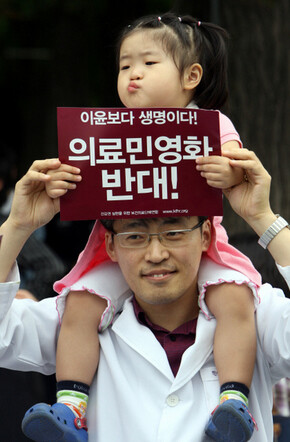hankyoreh
Links to other country sites 다른 나라 사이트 링크
Privatization of medical services an issue for candlelight protestors

“Privatization of medical care - Didn’t you, President Lee Myung-bak, know the United States, a nation you love, already has admitted its failure on the issue?”
Messages written by citizens to President Lee Myung-bak are posted to the wall surrounding the main building of Seoul City Hall whose repairs are under way. The voices of citizens carrying candles criticize various policies of the current government. The privatization of medical care is one of the issues being raised by demonstrators.
The People’s Countermeasure Council against Full Resumption of Imports of U.S. Beef Endangered with Mad Cow Disease has decided to expand the stage of citizen forums with five political issues in addition to the beef deal and on June 19 will intensively address the privatization of medical services. Privatization is a key word influencing the shaping of policies regarding health insurance, for-profit hospitals and private health insurance.
“Stop privatization of medical service” has become one of the main slogans of candlelight rallies because it has been of concern for a long time. During the presidential election held last year, the Korean Medical Association requested the abolishment of a medical system in which the government can appoint a hospital as a health insurance applied hospital. Some experts criticized the KMA's request as an unstable factor in the framework of health insurance. But, at that time, then-presidential candidate Lee Myung-bak replied that he would review the health insurance system thoroughly, planting a seed of unrest.
The KMA and owners of some large hospitals have insisted that the current medical system should be changed. Even if the medical industry has the potential to create economic development and profit, current laws and regulations are hindering this, according to the KMA and owners of some large hospitals. At the beginning of this year, KMA Chairman Ju Su-ho criticized the current medical system as a uniform and restrictive, downward equalization-style medical socialism with policies that suppress the medical service. A policy to privatize the medical service will guarantee choice regarding high-quality medical care, attract foreign demands for medical service by activating medical tourism and will develop medication-related insurance and beauty and tourism industries, Ju added.
However, protestors ask if there is anything hidden on the other side. Many citizens doubt that the privatization of medical service will result in reducing medical security for most of middle and low class inidividuals. Kim Hye-ryeon, who works near Seoul Plaza, said, “I watched ‘Sicko’ directed by Michael Moore. I don’t want to live in a society like the U.S. which dumps patients without medical insurance or money on the street.”
As a bill on medical service was announced on May 10 by the Ministry of Health, Welfare and Family Affairs rekindled debates over the privatization of medical service, the ministry hurriedly attempted to ease the situation, saying, “The ministry urgently selected necessary items out of a bill submitted by the government to the 17th National Assembly.” However, there is strong criticism that the government tries to dismiss the argument over the privatization of medical service as a rumor just as the government did so while reacting during the early days mad cow disease crisis.
Please direct questions or comments to [englishhani@hani.co.kr]
Editorial・opinion
![[Column] Park Geun-hye déjà vu in Yoon Suk-yeol [Column] Park Geun-hye déjà vu in Yoon Suk-yeol](https://flexible.img.hani.co.kr/flexible/normal/500/300/imgdb/original/2024/0424/651713945113788.jpg) [Column] Park Geun-hye déjà vu in Yoon Suk-yeol
[Column] Park Geun-hye déjà vu in Yoon Suk-yeol![[Editorial] New weight of N. Korea’s nuclear threats makes dialogue all the more urgent [Editorial] New weight of N. Korea’s nuclear threats makes dialogue all the more urgent](https://flexible.img.hani.co.kr/flexible/normal/500/300/imgdb/original/2024/0424/7317139454662664.jpg) [Editorial] New weight of N. Korea’s nuclear threats makes dialogue all the more urgent
[Editorial] New weight of N. Korea’s nuclear threats makes dialogue all the more urgent- [Guest essay] The real reason Korea’s new right wants to dub Rhee a founding father
- [Column] ‘Choson’: Is it time we start referring to N. Korea in its own terms?
- [Editorial] Japan’s rewriting of history with Korea has gone too far
- [Column] The president’s questionable capacity for dialogue
- [Column] Are chaebol firms just pizza pies for families to divvy up as they please?
- [Column] Has Korea, too, crossed the Rubicon on China?
- [Correspondent’s column] In Japan’s alliance with US, echoes of its past alliances with UK
- [Editorial] Does Yoon think the Korean public is wrong?
Most viewed articles
- 1[Column] Park Geun-hye déjà vu in Yoon Suk-yeol
- 2N. Korean hackers breached 10 defense contractors in South for months, police say
- 3Thursday to mark start of resignations by senior doctors amid standoff with government
- 4[Editorial] New weight of N. Korea’s nuclear threats makes dialogue all the more urgent
- 5Kim Jong-un expressed ‘satisfaction’ with nuclear counterstrike drill directed at South
- 6Will NewJeans end up collateral damage in internal feud at K-pop juggernaut Hybe?
- 7[Editorial] Japan’s rewriting of history with Korea has gone too far
- 8[Cine feature] A new shift in the Korean film investment and distribution market
- 9[Column] ‘Choson’: Is it time we start referring to N. Korea in its own terms?
- 10[Column] The clock is ticking for Korea’s first lady